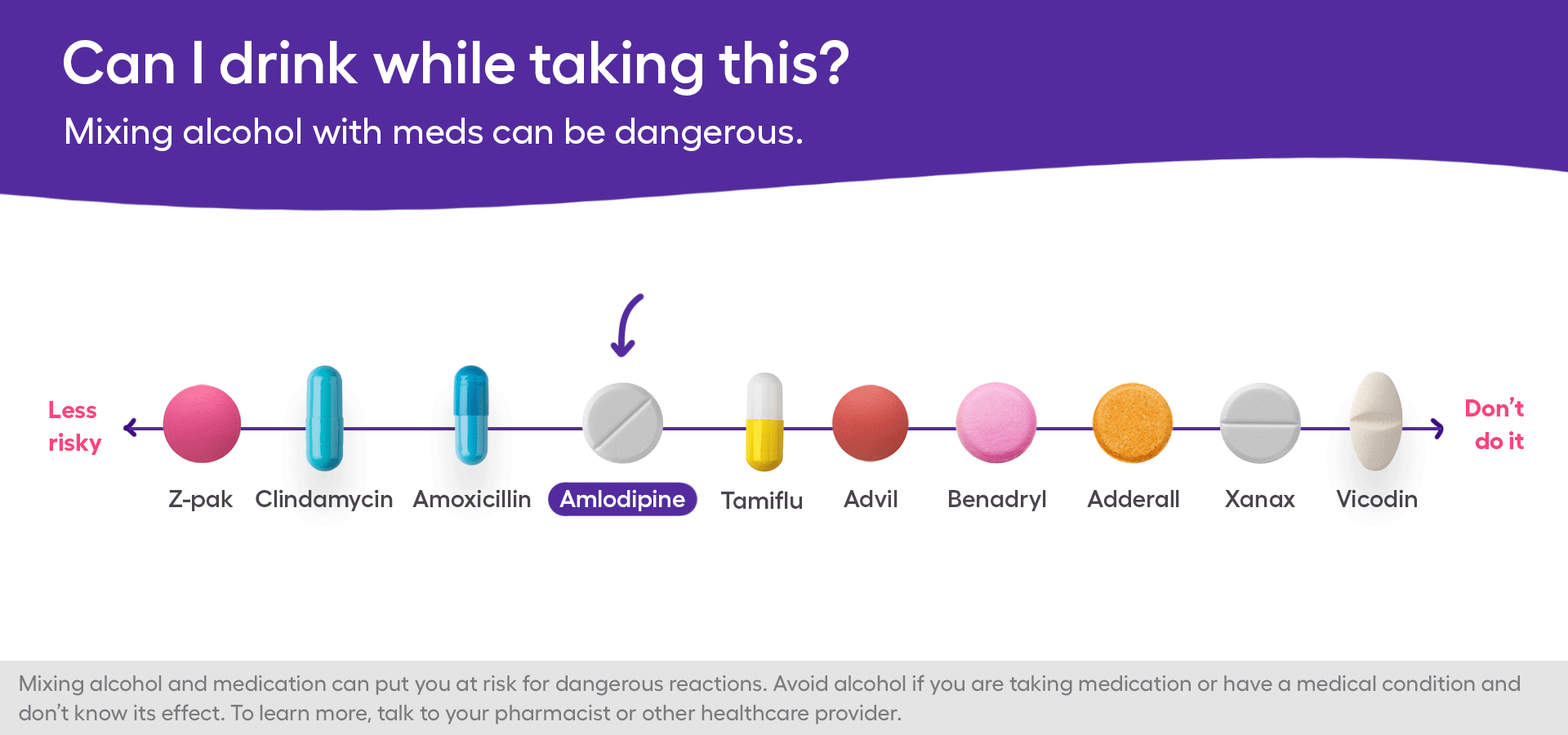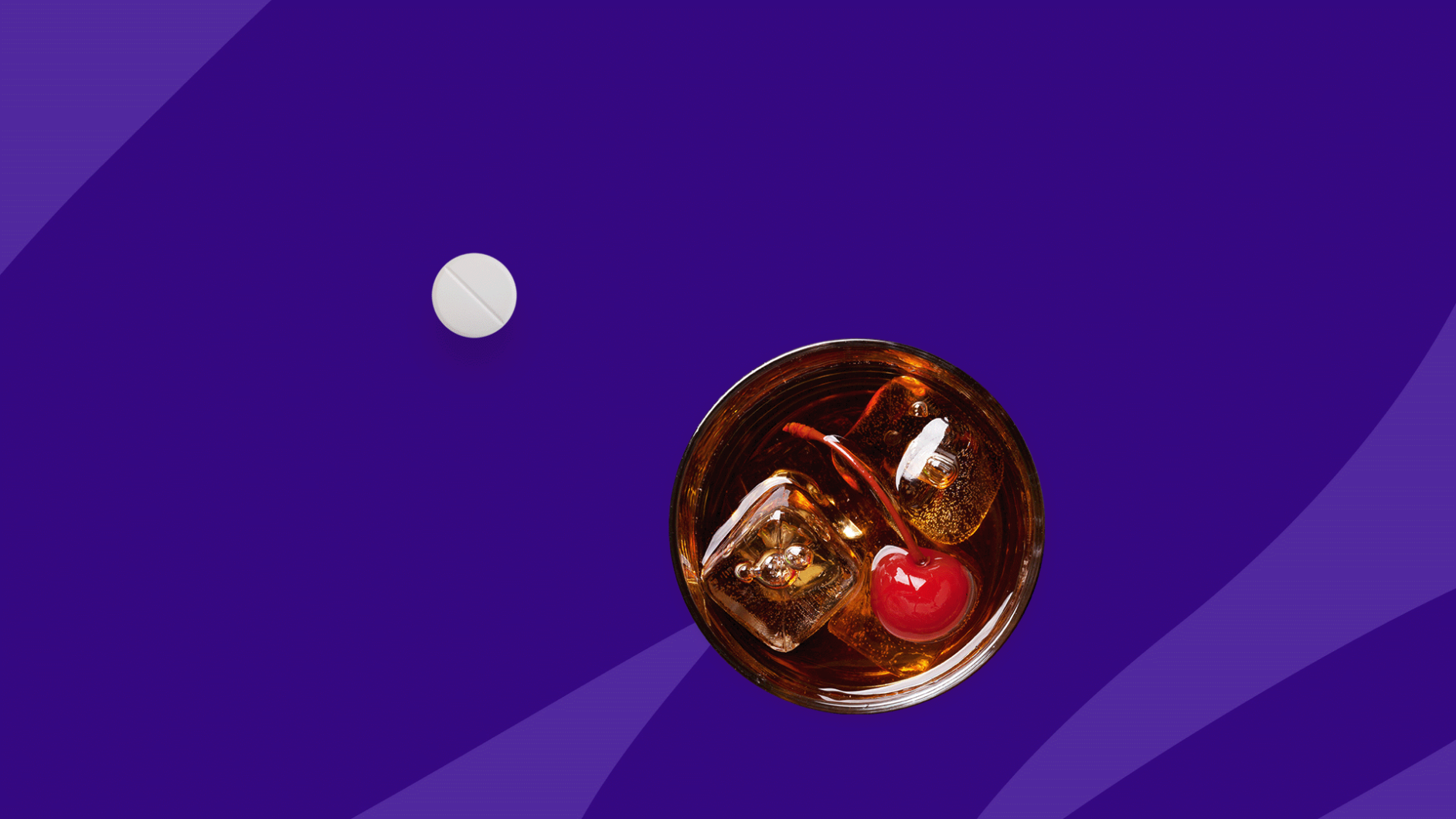Key takeaways
Mixing amlodipine and alcohol can increase the risk of side effects such as lightheadedness, dizziness, low blood pressure, or decreased effectiveness of amlodipine.
Excessive alcohol consumption while taking amlodipine may lead to serious health consequences like cardiovascular events, especially during the initial phase of treatment.
Drinking excessive amounts of alcohol can damage the liver, where amlodipine is processed, potentially leading to increased liver toxicity or exacerbating existing liver conditions.
Avoid or limit alcohol consumption while taking amlodipine, and consult your healthcare provider for advice tailored to your specific medical history and other medications.
While taking a high blood pressure medication like amlodipine, you might be apprehensive about whether you can drink alcohol. After all, too much alcohol can raise your blood pressure.
The fact of the matter is that there are some potential risks to be aware of before combining alcohol and amlodipine—such as an increased risk of side effects. Continue reading to learn more about mixing the two, the possible drug interaction, and the potential side effects you might experience.
What is amlodipine?
Amlodipine, also known by the brand name Norvasc, is a commonly prescribed antihypertensive or blood pressure medication. It’s part of a group of drugs, including diltiazem and verapamil, called calcium channel blockers that are used to treat hypertension (high blood pressure). It’s also used to treat angina (chest pain caused by reduced blood flow to the heart) or other conditions caused by coronary artery disease.
Amlodipine works by relaxing the blood vessels to lower blood pressure. It’s usually prescribed to be taken as an oral tablet once daily. The dosage ranges from 5 mg to 10 mg once per day in adults. Because amlodipine is heavily processed in the liver, the dosage is lower in older people or people with liver problems.
Save up to 80% on Amlodipine with SingleCare
Different pharmacies offer different prices for the same medication. SingleCare helps find the best price for you.
Can you mix amlodipine and alcohol?
Because alcohol can affect blood pressure and heart rate, it’s generally recommended to avoid mixing amlodipine and alcohol. If you choose to drink alcohol, it’s important to do so in moderation, as excessive alcohol consumption may increase the risk of serious health consequences like a cardiovascular event. However, the risk of a serious problem may be higher during the start of treatment rather than after several months of treatment with amlodipine.
Drinking in moderation means two drinks or fewer per day for men and one drink or fewer per day for women. Everyone’s response to amlodipine may vary, so it’s always a good idea to check with your provider before drinking while taking amlodipine, especially if you’re also taking other medications. They will be able to advise you on the specific risks and precautions for you based on your unique medical history.

Amlodipine and alcohol interaction
One of the risks of mixing amlodipine and alcohol is the possibility of an interaction. Amlodipine and alcohol side effects may overlap and be amplified when combining the two. Because alcohol can cause an increase or decrease in blood pressure, drinking alcohol with amlodipine can lead to low blood pressure or a decreased effectiveness of amlodipine. The side effects of amlodipine and alcohol may also include:
- Lightheadedness
- Dizziness
- Fatigue
- Drowsiness
- Upset stomach
- Nausea
- Palpitations
- Flushing of the skin
The occurrence and severity of side effects when mixing amlodipine and alcohol can vary depending on the dosage of amlodipine, how much alcohol is consumed, and whether they are taken together or within hours of consuming either substance. The higher the dosage of amlodipine and the larger the amount of alcohol consumed, the greater chance of a serious side effect. In addition, people with alcohol abuse disorder or those who binge drink may be at a higher risk of severe complications.
Rare but serious side effects of mixing amlodipine and alcohol may include:
- A fast heartbeat (tachycardia)
- High blood sugar levels (hyperglycemia)
- Heart rhythm problems
Long-term alcohol abuse and a high dosage of amlodipine may increase the risk of adverse effects such as trouble sleeping, depression, anxiety, or sexual dysfunction.
Because people taking amlodipine may be taking medications for other conditions, such as diabetes, high cholesterol, or arthritis, it’s important to consider the effects of alcohol on other processes in the body. Therefore, mixing amlodipine and alcohol use is not generally recommended, especially if other medications are being taken.
Amlodipine, alcohol, and the liver
Mixing amlodipine and alcohol can also affect the liver. Drinking excessive amounts of alcohol can cause damage to the liver, which can lead to a condition called alcoholic liver disease. Amlodipine is generally considered safe for the liver, but in some cases, it may cause elevations in liver enzymes, which are markers of liver injury.
When amlodipine and alcohol are consumed together, there may be a potential for increased liver toxicity. It’s important to be aware that excessive alcohol consumption can cause liver damage, and for people who have any existing liver diseases, this risk may be increased.
Long-term heavy alcohol use can lead to severe liver damage, so it’s important to monitor any changes in liver enzymes while taking amlodipine and alcohol together and to report any unusual symptoms to a healthcare professional.
People with liver disease or those who consume excessive amounts of alcohol should avoid or limit their consumption of alcohol while taking amlodipine. If you are unsure how much alcohol is safe to consume while taking amlodipine, it’s best to speak with a healthcare professional who can provide guidance based on your individual needs.
Alcohol and blood pressure medications
Alcohol can have different effects on the heart and blood pressure, which may lead to varying effects on blood pressure medications. In moderate amounts, alcohol can cause an increase in heart rate and a temporary rise in blood pressure. Some studies suggest that high-dose alcohol can cause an initial decrease in blood pressure followed by an increase in blood pressure 12 hours after consumption.
It’s important to consider the effects of mixing alcohol with blood pressure medications, especially if you have a history of heart disease, heart attack, or other heart problems. Drinking excessive amounts of alcohol may increase the risk of certain side effects of beta blockers, such as slow heart rate and fatigue. Drinking alcohol with ACE inhibitors, such as lisinopril and enalapril, or angiotensin receptor blockers (ARBs), such as valsartan and losartan, may lead to increased dizziness and lightheadedness. Drinking alcohol with diuretics like hydrochlorothiazide may increase the risk of dehydration, as alcohol also has diuretic effects.
It’s important to keep in mind that everyone’s response to these medications may vary, and the effects of mixing alcohol and antihypertensive medications may depend on a person’s overall health, the amount of alcohol consumed, and the duration of usage. It’s always recommended to check with a healthcare professional before consuming alcohol while taking any medication, especially if you have any existing medical conditions or taking other medications.
Bottom line
In general, it’s not recommended to mix amlodipine with alcohol. Alcohol can cause changes in blood pressure, which can lead to low blood pressure or a decrease in the effectiveness of amlodipine. Excessive alcohol consumption can amplify the serious side effects of amlodipine.
It’s recommended to seek medical advice from a healthcare provider if you have any questions or concerns about mixing amlodipine with alcohol. Make sure to tell your healthcare provider about other medications you may be taking, including over-the-counter medicines and herbal supplements. In most cases, it’s best to avoid alcohol or limit the amount you drink, especially if you are taking other medications or have another medical condition.






